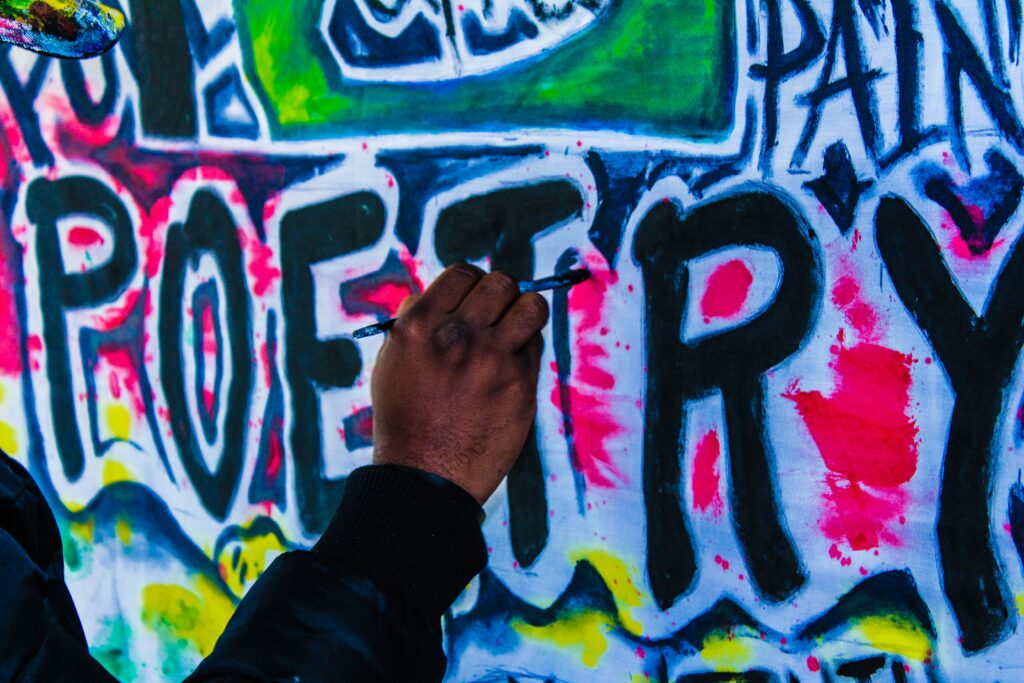
Why choose poetry?
We’ve been talking about the concept of inquiry a lot in class. It’s new to me, but I think it’s safe to say that poetry is a great place for inquiry. Firstly, because poetry is by definition subversive, in that it subverts language. It pushes the boundaries of meaning and feeling and invites unpredictability whether it be visually, auditorily, or cognitively. A poem is renewed each time it is consumed by the person who comes in contact with it. Much like inquiry, poetry asks questions rather than offer answers. I happen to believe that everyone is capable of (and would benefit from) playing with language through poetry, especially in times when productivity and logic seem to be valued above all else.
My mother tongue is Portuguese and how I feel about it is perfectly captured in the words of the great Fernando Pessoa: “my homeland is the Portuguese language”. It is where I feel most at ease, most capable, and most aware of my surroundings. It’s also in Portuguese that I usually write poetry (and prose) but in the spirit of inquiry, I will use this project to venture into anglophone poetry as well.
But first, here is Maria Bethânia reciting “Monólogo de Orfeu”, an excerpt from Vinicius de Moraes and Tom Jobim‘s play Orfeu da Conceição, a retelling of the myth of Orpheus set during Carnaval in a Brazilian favela in 1965 (the poem starts at minute 2:00). I have added the written version after the video, so you can get a glimpse of some Portuguese words, but I feel like this reading can be thoroughly enjoyed even without comprehension of the content. Poetry doesn’t always require understanding.
Monólogo de Orfeu
Mulher mais adorada
Agora que não estás
Deixa que rompa o meu peito em soluços
Te enrustiste em minha vida
E cada hora que passa é mais porque te amar
A hora derrama o seu óleo de amor em mim, amada
E sabes de uma coisa?
Cada vez que o sofrimento vem
Essa saudade de estar perto, se longe
Ou estar mais perto, se perto
Que é que eu sei!
Essa agonia de viver fraco
O peito extravasado, o mel correndo
Essa incapacidade de me sentir mais eu, Orfeu
Tudo isso que é bem capaz
De confundir o espírito de um homem
Nada disso tem importância
Quando tu chegas com essa charla antiga
Esse contentamento, essa harmonia, esse corpo!
E falas essas coisas que me dão essa força
Essa coragem, esse orgulho de rei
Ah, minha Eurídice!
Meu verso, meu silêncio, minha música!
Nunca fujas de mim
Sem ti sou nada, sou coisa sem razão, jogada
Sou pedra rolada
Orfeu menos Eurídice: coisa incompreensível
A existência sem ti
É como olhar para um relógio só com o ponteiro dos minutos
Tu és a hora, és o que dá sentido e direção ao tempo
Minha amiga mais querida
Qual mãe, qual pai, qual nada!
A beleza da vida és tu, amada
Milhões amada!
Ah! criatura! Quem poderia pensar que Orfeu
Orfeu, cujo violão é a vida da cidade
E cuja fala, como o vento à flor, despetala as mulheres
Que ele, Orfeu, ficasse assim rendido aos teus encantos?
Mulata, pele escura, dente branco
Vai teu caminho que eu vou te seguindo no pensamento
E aqui me deixo rente quando voltares, pela lua cheia
Para os braços sem fim do teu amigo
Vai tua vida, pássaro contente
Vai tua vida que eu estarei contigo

A brilliant start,
to a beautiful art.
If only my reply,
could capture your eye.
Great poem, Sean! I might post it.
Thank you for sharing, Julia! I do not speak Portuguese, but like you have said, the beautiful thing about poetry, specifically spoken word poetry, is that you can feel the emotion without necessarily understanding the meaning. I noticed specifically her tone throughout and that she ended her poem in a whisper. I would love to know how the meaning connects to that tone choice!
I love that you noticed that, Sienna!